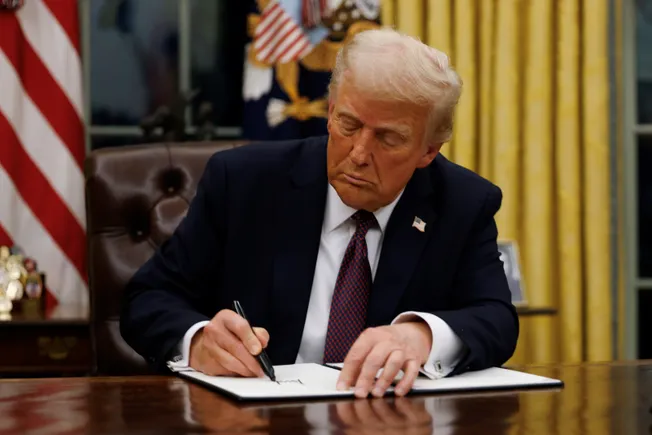President Donald Trump signed a series of executive orders on his first day in office Monday, many of them with repercussions for the construction industry.
The actions embody a shift in federal priorities around critical issues like oil and gas drilling, environmental permitting, tariffs and the availability of labor.
Trump declared a national energy emergency, which gives him the authority to suspend some environmental regulations and speed permits for oil and gas drilling.
“We will drill, baby, drill,” Trump said during his speech after taking the oath of office.
His order directs federal agencies to undertake all available efforts to eliminate delays within their respective permitting processes.
“For any project an agency head deems essential for the Nation’s economy or national security, agencies shall use all possible authorities, including emergency authorities, to expedite the adjudication of Federal permits,” the order reads. “Agencies shall work closely with project sponsors to realize the ultimate construction or development of permitted projects.”
Trump also made moves to limit the adoption of certain types of renewable energy and related products, including wind energy and electric vehicles, which could put a damper on construction of these types of projects. He ordered agencies to pause disbursement of Infrastructure Investment and Jobs Act and Inflation Reduction Act funds for EV charging stations.
Some of the new energy policies will require action by federal agencies or Congress and others could face legal challenges, according to The New York Times.
Immigration crackdown
In a move that could affect the availability of labor for construction projects across the country, Trump declared a national emergency at the southern border designed to crack down on immigration.
The push includes ending birthright citizenship, meaning that the federal government won’t recognize the birthright of children born to parents in the country without legal status. At least one major lawsuit was filed against it on Monday, arguing that citizenship by birth is a constitutional right, according to USA Today.
Trump said his administration also intends to resume construction of a barrier along the U.S.-Mexico border. During his speech after taking the oath of office, he said his original plan for a wall was for an unscalable concrete design.
“I wanted that sucker to go up 50, 60 feet, nice Y-shape. Beautiful. I love construction,” he said.
Instead, he said, the sections of wall that have been built use hardened steel, reinforced concrete and anti-climb panels.
“It wasn’t pretty, but it worked,” he said. Sometimes you sacrifice beauty for efficiency.
Tariffs
In a White House signing ceremony Monday evening, the new president said that his administration wants to impose 25% tariffs on Mexico and Canada starting as early as Feb. 1.
In addition, an executive action signed Monday directs federal agencies to look into the causes of America’s trade deficits with foreign nations. It also aims to build an “External Revenue Service” to collect tariffs, to identify unfair trade practices and to review existing trade agreements for potential improvements.
For commercial builders and their clients, tariffs could spell major price hikes, experts have told Construction Dive. Broad enforcement could disrupt construction by increasing the costs of materials from specific countries, potentially delaying or deferring projects altogether, Chris Fisher, managing principal at Troy, Michigan-based consulting group Ducker Carlisle, said in December.
“What will create challenges for commercial construction is if we see a significant amount of tariffs that are announced, followed through and then actually enforced,” said Fisher.

